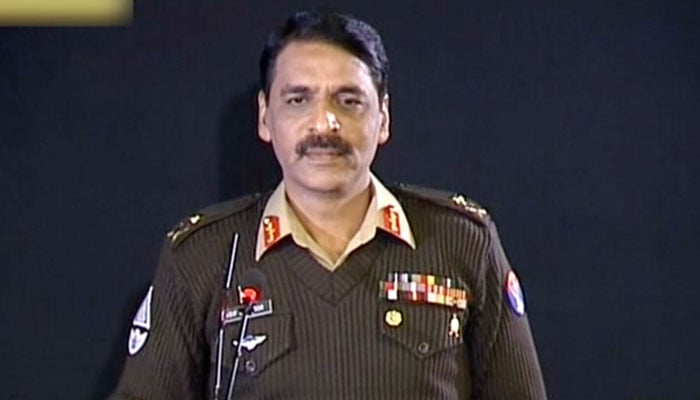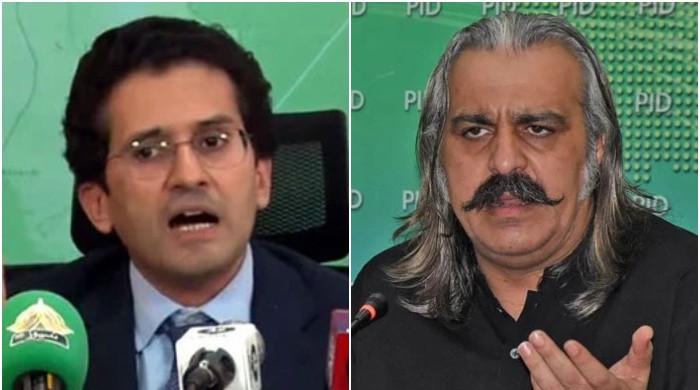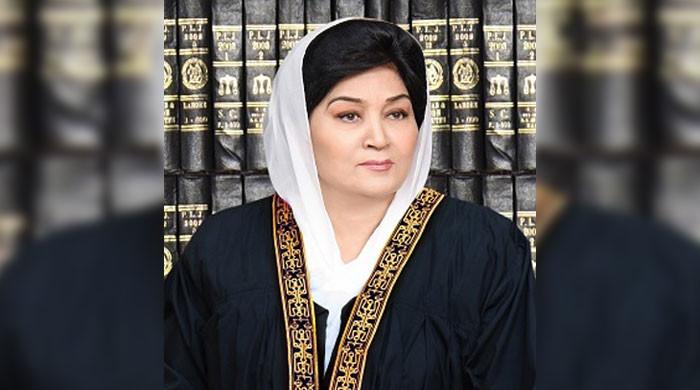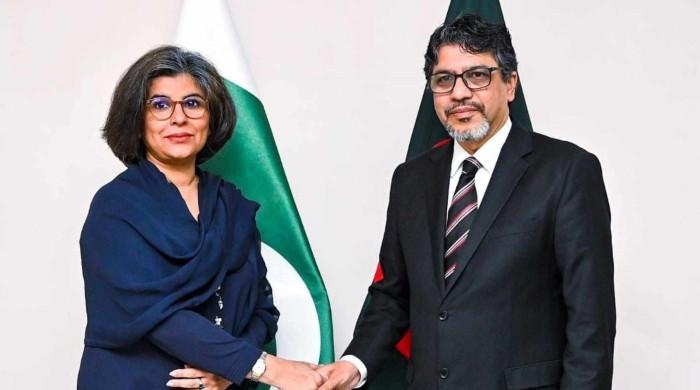DG ISPR urges media to show progress, potential of Pakistan
Major General Ghafoor says Pakistan is at a watershed of history, responds to India army chief and briefs media on improved security situation
December 06, 2018

RAWALPINDI: Director General Inter-Services Public Relations (ISPR) Major General Asif Ghafoor on Thursday called upon the media to create public awareness and project a positive image of Pakistan.
Addressing a news conference here today, the DG ISPR said the media was the fourth pillar of the state and had a front line role to play in the fifth generation and hybrid war imposed upon Pakistan.
"The media has the most critical role among all institutions due to 5th generation warfare. The media turned around the situation in Zarb-e-Azb and Radd-ul-Fasaad. I have met anchor persons and media owners and urged them for a more positive role by media. Media has a front line role in 5th generation warfare," he said.
“You [journalists] are the opinion makers. Show all the good things in our country…Create public awareness. Show them what has improved in Pakistan. This doesn’t mean don’t show the bad. The power which the media has, no other state institution at this time has that sort of power because there is fifth generation warfare and hybrid war. Your target through perceptions and narrative is to reach the youth," he said.
"For six months, show Pakistan’s potential and progress within and outside and see where the country reaches,” he added the Maj-Gen Ghafoor, calling on everyone to play their role for a more prosperous Pakistan.
‘Pakistan standing at watershed’
Major General Asif Ghafoor spoke of how 70 years had passed and we were still telling the nation that the country is passing through difficult times. “Why did these difficult times come and who is responsible? There is a debate on this but no result. We keep on blaming each other.”
The DG ISPR said if we remained in the past we could not move forward. “We can learn from the past. We have a perpetual threat on our eastern border. We have fought wars with them. We have unresolved issues such as Kashmir and peace has not been achieved.”
He also spoke of the country’s fault lines in the economy, governance, judicial system, education system and the type of government. “We also have internal fault lines. On the name religion and sectarianism, there is incitement. We have been involved in this. We have been pointing out the mistakes of others without looking at our own. This has been exploited by our enemies.”
The military spokesman added that from a difficult time we were now at what is a watershed of our history. “We have fought wars, fought terrorism, given sacrifices, our economy was ruined. But today we stand at that watershed beyond which there is either prosperity or something worse than difficult times.”
Major General Ghafoor said in the past few years the country has made positive progress, questioning why did we want to reverse it. “Can we not move towards a better Pakistan from this watershed? We have to make the decision on whether to stay like this or jump on the roller coaster of success.”
“I am the spokesman of today’s Pakistan Army and can tell you that today’s army is not the one from the past. Everyone in the army has seen a time in which their colleague is dying in their arms. For 15 years the Pakistan Army has not sat in their homes. They have been patrolling cities and neighbourhoods for your protection. The nation and citizens have also sacrificed a lot. All institutions have worked together, but if you remain in the same ups and downs of the past 70 years, then you will not move towards the silver line which can be seen from this watershed."
DG ISPR warns PTM not to cross the line
Speaking at the press conference, Major General Asif Ghafoor warned the Pashtun Tahafuz Movement (PTM) not to cross the line.
The military spokesman said the army was using confidence-building measures with the PTM and not handling them with heavy-handedness. “They [PTM] are hurt and have suffered in the war. We still want to deal with them politely but they are headed in the direction where the same will happen to them which happens when the state establishes its writ.”
During his news conference, the military spokesman said the PTM had started out with three demands which were a reduction in check posts, clearance of mines and missing persons.
Major General Bajwa said as the security situation had improved, the Pakistan Army had decreased its check posts along with their operating procedures. “In 2016 there were 469 check posts in KP and Fata, as we speak today there are 331. We will not keep a single check post if we feel the security situation does not require it.”
He added that the soldiers at the check posts could be from Turbat, Landhi, Lahore or from Gujrat. “He [the soldier] is miles away from home and is standing there to protect the residents of that area."
The military spokesman also linked this to the security situation in Afghanistan. “We have improved the security situation at our end…If today we can get surety that Afghanistan has control we can bring back the 200,000 troops. We cannot do this as the threat across the border has not been eliminated.”
He added that border fencing was underway and by the end of next year when this is completed the cross-border threat would be decreased.
Speaking on the second demand of the PTM, the military spokesman said there were 43 teams of engineers in KP and Fata who were working in various districts to clear mines. “These teams till now have cleared near 44 per cent of the area. It is important to remember that a war has taken place in this area. Several of our troops have also suffered casualties due to these mines and unexploded bombs. A casualty whether of a civilian or soldier is of a Pakistani and one day we will clear this area of the explosives and mines.”
On the third demand related to the missing persons, DG ISPR said the initial lists given by the PTM were of 7,000, 8,000 and 9,000 names. “In 2011 there was a commission formed on enforced disappearances which at that time was headed by Justice Fazal now it is Justice Javed. On one hand, the cases were ongoing in this commission and simultaneously some complaints would go to the court. This way work was being done in two places. Lately, the Supreme Court gave the order to do this through the commission.”
According to the DG ISPR, from 2010-11 there were 7,000 cases received and the process was started. There were hearings by the commission on a daily basis with benches in Islamabad, Karachi and Quetta. “Of these 7,000 cases over 4,000 cases had been resolved. At this time 3,000 plus cases were under process. Of these 3,000 cases, 2,000 were with the commission.”
The DG ISPR said that a question arose on how it could be proven that those missing were not part of the TTP, fighting somewhere else or had been killed. “Any Pakistani who is missing is dear to us as they should be. The actual loss is of the family. But also see that the 70,000 Pakistanis martyred or injured fighting this war are also missing from this world to stop this war. To move towards betterment after a war it is necessary to forget the losses. We want this process to move forward and the remaining missing persons to be traced.”
The military spokesman added that apart from these three the PTM did not have any other demands. “But you have seen how PTM went beyond these demands. In my previous press conferences, I have spoken to you about our visibility on how the PTM is working. And when the time comes we will tell you about it.”
He went on to say that there had been complaints by some that the government and Pakistan Army had not dealt with the PTM with a strict hand as they had chanted slogans which would be insulting to soldiers or the families of martyrs. “It is said that the state is everyone’s mother. We engaged with them [PTM] politely because of two reasons. These Pakistani brothers or ours are from a region which has seen a lot of war. They have faced terrorism and when the military operations took place they faced administrative inconveniences. They are our people, they are sad and have faced loss. Till now they have not resorted to violence. They have said the wrong things but have not resorted to violence. It is my request to them that their genuine demands are being dealt with by the government and Pakistan Army even before they made them.”
“When it comes to these three demands of theirs, the state has cooperated with them. But the direction they are heading in now, it can reach a stage where they will cross that line where we will have to use our authority. I request them as peaceful Pakistanis, we realise their sorrow and pain, but they should not cross those lines where the state has to use its force to control the situation.”
Improved security situation
In his statements on Pakistan’s security situation, DG ISPR said Pakistan’s war on terror had been mostly fought in Khyber Pakhtunkhwa and Fata. He said terrorist incidents had decreased in Pakistan.
“In 2013 on the average there were 7-8 terrorist incidents monthly. In 2018 this average has decreased and hope the day comes when there are no terrorist incidents in Pakistan.”
The military spokesman also compared Balochistan to KP, Fata and spoke on the deployment of troops in these areas. He said in Fata which was 3 per cent of the country’s geography over 200,000 troops had been deployed. There were 65,000-70,000 troops deployed in Balochistan which was 43 per cent of the country’s geography and 6 per cent of the population.
“Lately we have changed the deployment there [Balochistan]. Our forces and headquarters were initially in Quetta but according to the geography we have split them to different sectors and done a readjustment. But this readjustment more than operations is aimed at providing security to socio-economic projects.“
He added terrorist incidents in Balochistan had also decreased. “In 2016 there 119 abduction cases, in 2017 there were 82 and in 2018 there were 46. The graph of terrorist incidents has also decreased”
According to the military spokesman, the Pakistan Army was focusing more on Balochistan due to the improved security situation in KP and Fata.
Speaking on the surrender of Ferraris in the province, the DG ISPR informed reporters that over 2,200 had done so in the last three years. “This is a good step and it is my request to those [Ferraris] in the mountains who want to destabilise the country on the directives of those sitting abroad to join the national mainstream and play their role in the prosperity of Pakistan and Balochistan.”
On Karachi, he said in the last few years the law and order situation had immensely improved in the city. “In 2013 there 4,508 various incidents in the city…in 2017 there was no terrorist incident and in 2018 barring the Chinese Consulate attack and minor bridge blast the security situation is really good. The credit for this goes to Pakistan Rangers Sindh and other law enforcement agencies. There has been a 99 per cent decrease in terrorism, 97 per cent in target killing, 96 per cent in extortion and 93 per cent in kidnapping for ransom cases.”
“At one time Karachi was number 6 according to the crime rate in the world. Today Karachi is 67th. There are several cities of first class countries which have a higher crime rate than Karachi.”
Briefing reporters on Operation Radd-ul-Fasaad which was nearing two years, the military spokesman said till now 44 major operations had taken place across the country and 42,000 IBOs and combing operations.
“Our aim of de-weaponising has not progressed as we hoped. We are working with the government through legislation and licensing process to improve this. Till now near 32,000 weapons have been recovered from across the country and 4.34 million types of ammunition.”
The DG ISPR stressed that no war could end just by conducting operations. “When your kinetic operations end there is a need for socio-economic development. “
According to the spokesman, the army with the government was working on socio-economic projects and if they continued on this track enduring peace would be established.
The number of polio cases in the country has also decreased, and the day would come when Pakistan would be polio-free, DG ISPR said.
Army's accountability
Commenting on the accountability process of the Pakistan Army, DG ISPR said, "We are a disciplined force. There is a chain of command and rules and regulations. There is a branch which is tasked with discipline and accountability."
He added despite the measures in place if rules were violated punishment was given. "In 2017-18 almost 400 Pakistan officers have been given punishments which range from a warning to dismissals and even jail."
The military spokesman also said officers faced stricter punishments than soldiers.
Relations with India
The DG ISPR told reporters ceasefire violations at the Line of Control (LoC) had risen.
“In 2017 there were 1,881 ceasefire violations and this year till now there have been 2,593 violations. In 2018 there were 55 civilians martyred and 300 injured which is the most in history.”
He added that the civilians’ casualties showed India was deliberately targeting civilians. “We cannot target civilians like this. Ceasefire violations is a concern and we hope Indian understands they impact this was on relations.”
Further, Major General Ghafoor said the Pakistani government had taken several initiatives with India so relations could improve. He said the Indian government does not agree to dialogue.
He added that the government had taken the initiative in Kartarpur and made a corridor for the Sikh community so they could fulfil their obligations.
“The government took the initiative to make the Kartarpur corridor which was projected in a negative light in the Indian media,” he said.
Showing a slide of the corridor, the DG ISPR said from the point of entry there would be fencing till the place of worship and there would only be one-way entry. “This is a good project which the government will complete in six months. It will have a capacity of 4,000 pilgrims daily. We hope India will give a good response to this goodwill gesture of ours.”
Responding to a recent statement by the Indian army chief in which he said talks could not be held until Pakistan became a secular state, DG ISPR said: “We are a Muslim state. They [India] do not need to tell us what kind of country we should be. Are they secular? Look what is happening to the 200 million Muslims there. We have opened Kartarpur in respect for another religion. We provide security to temples and churches in Pakistan. What happened at the Babri Masjid there? I think he needs to look inward to become secular first and tolerate us the way we are.” ”
Afghan reconciliation
The military spokesman said there was a need for political reconciliation in Afghanistan when asked about US President Donald Trump’s letter to Prime Minister Imran Khan. He emphasised that Pakistan had always stressed the need for a political reconciliation in Afghanistan.
"Pakistan will take every step to make this reconciliation successful. This political reconciliation must succeed. We hope the US leaves Afghanistan as a friend of the region, not as a failure."
In response to another question, DG ISPR categorically stated that Pakistan would never fight anyone’s war.
“There is no doubt that we will never fight anyone’s war. This war was imposed on us.”
PM’s statement taken out of context
When asked about Prime Minister Imran Khan’s statement during a recent television interview of the army supporting PTI’s manifesto, DG ISPR replied that he had listened to the prime minister’s interview thrice.
He told reporters that the prime minister’s statement on this issue was taken out of context.











